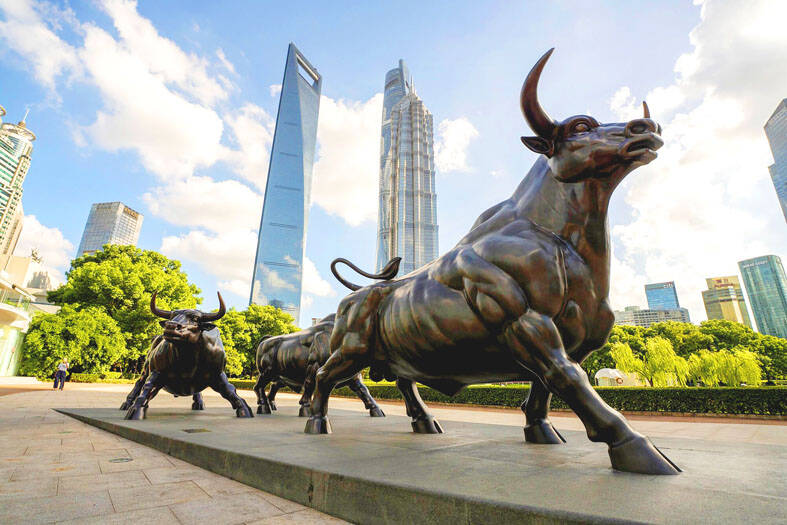China’s economy is buckling under the weight of tariffs and a deep-rooted property crisis, yet stocks are extending their bull run — a disconnect that is stirring doubts on the rally’s staying power.
In just the past month, onshore stocks have added almost 1 trillion US dollars to their market value, the Shanghai Composite Index has hit a decade-high, and the CSI 300 Index has taken its advance from this year’s low to more than 20 percent. That is when nearly every recent economic indicator — from consumption trends and home prices to inflation — has brought red flags for investors.
The rally has been driven by cash-rich investors shifting into stocks amid a lack of alternatives. While the market’s steady advance might suggest less risk of a sudden correction, some analysts say there is a bubble in the making. Nomura Holdings Inc is cautioning against “irrational exuberance,” while TS Lombard is calling the mismatch a stand-off between “market bulls and macro bears.”

Photo: Bloomberg
“Markets might be expecting, either correctly or incorrectly, that macroeconomic fundamentals will improve,” said Homin Lee (李霍民), senior macro strategist at Lombard Odier Ltd in Singapore. “But a bull market will not be sustainable if inflation remains close to 0 percent and corporate pricing power faces severe headwinds from weak domestic demand.”
Stocks rallied again on Monday as chip-related shares extended a recent surge. The benchmark CSI 300 as well as a gauge of Chinese equities listed in Hong Kong jumped more than 1 percent in early trading.
A deflationary spiral that erodes corporate pricing power in the world’s second-largest economy is one of the biggest reasons to doubt the sustainability of the current rally.
Consumer prices were flat last month, producer prices fell for a 34th month and the GDP deflator extended its negative streak. While Beijing has embarked on a campaign to curb overcapacity and rein in price wars, it has had limited impact so far.
Growth slowed across the board last month with factory activity, investment and retail sales disappointing, suggesting the so-called “anti-involution” drive and spillovers from US President Donald Trump’s tariffs are casting a pall over the economy.
The troubling picture has fueled expectations that Beijing would step up support, but the policy rollout so far suggests officials are steering away from the large-scale stimulus playbook, instead preferring a measured approach.
Equity gains are also complicating policy response to the economy’s slowdown, Nomura said, as pro-growth measures risk inflating a stock-market bubble.
Market watchers are also drawing comparisons to the start of the 2015 boom-bust cycle. Back then, a surge in margin trading sent stocks soaring, before a clampdown on such leveraged activities triggered an epic crash.
The amount of outstanding margin debt is at 2.1 trillion yuan (US$293 billion), compared with 2.3 trillion yuan at the 2015 peak. China’s equity gains tend to have strong correlations with liquidity as well as margin balances.
“The abundant liquidity in the market and the gradual wake-up of animal spirits remind us of the crazy times a decade ago,” said Hao Hong (洪灝), chief investment officer at Lotus Asset Management Ltd. “Of course, it is still early days.”
China’s bull market “is more of a mystery box than a conventional growth story,” said Hebe Chen (陳碧菲), an analyst at Vantage Markets Pty Ltd in Melbourne. “The risk is that once sentiment fades, investors would flee in no time.”

Nvidia Corp chief executive officer Jensen Huang (黃仁勳) on Monday introduced the company’s latest supercomputer platform, featuring six new chips made by Taiwan Semiconductor Manufacturing Co (TSMC, 台積電), saying that it is now “in full production.” “If Vera Rubin is going to be in time for this year, it must be in production by now, and so, today I can tell you that Vera Rubin is in full production,” Huang said during his keynote speech at CES in Las Vegas. The rollout of six concurrent chips for Vera Rubin — the company’s next-generation artificial intelligence (AI) computing platform — marks a strategic

REVENUE PERFORMANCE: Cloud and network products, and electronic components saw strong increases, while smart consumer electronics and computing products fell Hon Hai Precision Industry Co (鴻海精密) yesterday posted 26.51 percent quarterly growth in revenue for last quarter to NT$2.6 trillion (US$82.44 billion), the strongest on record for the period and above expectations, but the company forecast a slight revenue dip this quarter due to seasonal factors. On an annual basis, revenue last quarter grew 22.07 percent, the company said. Analysts on average estimated about NT$2.4 trillion increase. Hon Hai, which assembles servers for Nvidia Corp and iPhones for Apple Inc, is expanding its capacity in the US, adding artificial intelligence (AI) server production in Wisconsin and Texas, where it operates established campuses. This

US President Donald Trump on Friday blocked US photonics firm HieFo Corp’s US$3 million acquisition of assets in New Jersey-based aerospace and defense specialist Emcore Corp, citing national security and China-related concerns. In an order released by the White House, Trump said HieFo was “controlled by a citizen of the People’s Republic of China” and that its 2024 acquisition of Emcore’s businesses led the US president to believe that it might “take action that threatens to impair the national security of the United States.” The order did not name the person or detail Trump’s concerns. “The Transaction is hereby prohibited,”

Garment maker Makalot Industrial Co (聚陽) yesterday reported lower-than-expected fourth-quarter revenue of NT$7.93 billion (US$251.44 million), down 9.48 percent from NT$8.76 billion a year earlier. On a quarterly basis, revenue fell 10.83 percent from NT$8.89 billion, company data showed. The figure was also lower than market expectations of NT$8.05 billion, according to data compiled by Yuanta Securities Investment and Consulting Co (元大投顧), which had projected NT$8.22 billion. Makalot’s revenue this quarter would likely increase by a mid-teens percentage as the industry is entering its high season, Yuanta said. Overall, Makalot’s revenue last year totaled NT$34.43 billion, down 3.08 percent from its record NT$35.52